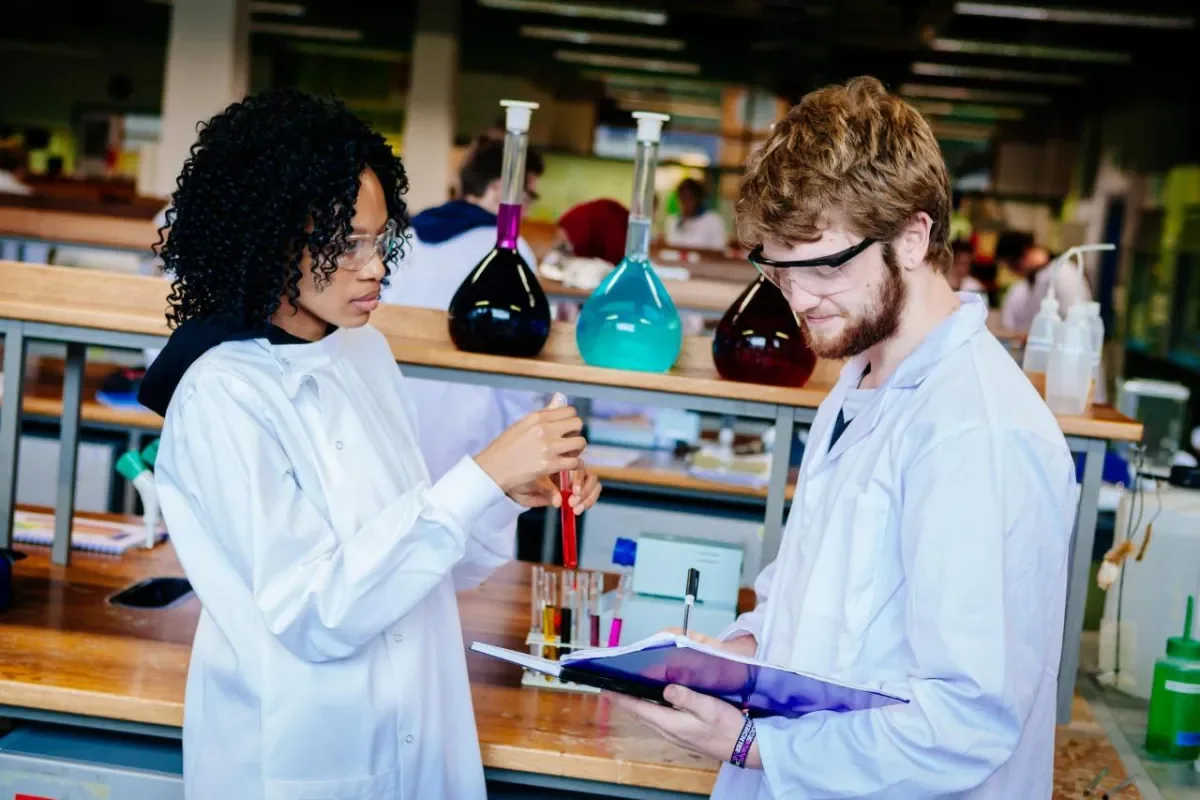
INTRA Programme BSc Chemical & Pharmaceutical Sciences

Objective
Considered by most scientists to be the central science among the science subjects, chemistry has a wide range of industrial applications that affect our daily lives. Chemists develop new materials, drugs and pharmaceuticals and they design cleaner and more efficient reaction processes to produce them. Students from the BSc in Chemical and Pharmaceutical Sciences develop understanding and skills in chemistry within both a theoretical and applied context. The emphasis is on applications and industrial relevance, particularly within the pharmaceutical industry, with the theoretical and practical aspects taught through application. This leads to a familiarity with the basic principles of chemistry, and enables development of an impressive range of problem-solving skills.
Programme Outline
This is a four-year, full-time degree course. The four years are broken down as follows:
Year One: learning and developing essential background knowledge of mathematics, chemistry, physics and biology
Year Two: building on the foundational subject in year one, with a focus on chemistry and biology relating to pharmaceutical chemistry. In addition, IT and computing skills are developed. Modules include both theoretical and practical chemistry (organic, inorganic, physical, pharmaceutical), biology (biomolecules and bioorganic chemistry), statistics and probability, and visualisation of laboratory data
Year Three focuses on preparation for industrial placements, with laboratories in synthesis and analysis of pharmaceuticals, and modules on separation techniques, regulation, data analysis, medicinal chemistry and formulation, as well as advancing knowledge in organic and inorganic chemistry and introduction of computational chemistry.
Year Four features advanced modules in spectroscopy, organic and inorganic chemistry, as well as a literature review, drug design workshop and a 12-week research project. Students choose between specialist modules in medicinal chemistry or supramolecular and interfacial chemistry.
Work Areas
The potential careers in chemical and pharmaceutical sciences are diverse. The following are just some examples:
Quality Control – working in a lab in a regulated environment for pharmaceutical, veterinary or food and beverage industries
Other pharmaceutical manufacturing roles – Quality Assurance, Validation of methods or instruments
Formulation – investigating stability of formulations of drugs, e.g. injectable, subcutaneous, quick dissolve and more; preparation of cosmetics
Synthetic chemist – making new molecules, for a range of applications, e.g. materials, pharmaceuticals
Any area of chemical research, e.g. synthesis, analysis, application, sensors, assay development, etc.
INTRA Internship
Students are required to complete a six month placement at the end of third year.
Course Modules
- Chemistry
- Biology
- Physics
- Maths
- Interdisciplinary Science
- Organic, Inorganic and Physical Chemistry Labs
- Spectroscopic Workshop
- Organic Chemistry
- Inorganic Chemistry
- Spectroscopy and Physical Chemistry
- Biomolecules and Metabolism
- Bio-organic and Pharmaceutical Chemistry
- Thermodynamics and Kinetics
- Computing
- Probability and statistics
- Organic, Analytical and Pharmaceutical Chemistry Labs
- Separation Technique
- Organic Chemistry
- Organometallics and Polymer Chemistry
- Medicinal Chemistry
- Computational and Inorganic Chemistry
- Formulation
- Regulation and Data Analysis
INTRA
- Advanced Spectroscopy
- Advanced Topics in Organic Chemistry
- Bio-inspired Synthesis
- Advanced Inorganic Chemistry
- Advanced Medicinal Chemistry (Option A)
- Interfacial and Supramolecular Chemistry (Option B)
- Drug Design Workshop
- Literature Review
If you would be interested in hiring from this programme, please get in touch.
| INTRA Coordinator | Email Address | Contact Number |
| Fiona Deane | fiona.deane@dcu.ie | 01-7008877 |
